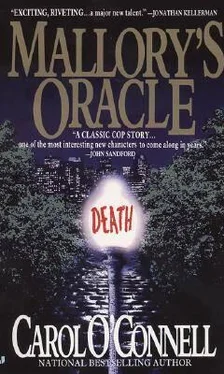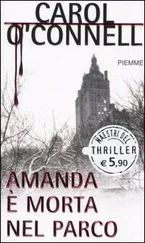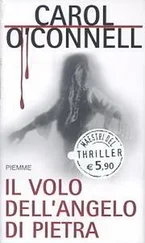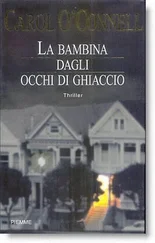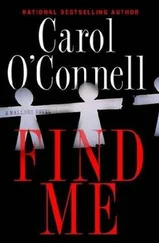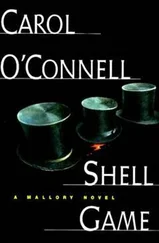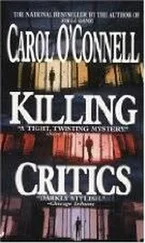The gramophone began to play. The music was classical, melding into Twenties tunes, and then to old Fifties-style rock'n'roll. Mallory lifted her chin only slightly in recognition of an album from Markowitz's basement collection.
Redwing plunged her hand into the pile of objects at the center of the table and pulled out Markowitz's watch. The music stopped.
Redwing held the pocket watch by its chain, and her eyes closed as the watch dropped lower and lower, finally lying flat on the table. The gold chain drifted from her splayed fingers. Redwing's eyes were rolling back in their sockets. Her hands pressed flat on the tablecloth. She began to rock slowly, gently at first, and then faster and faster, jerking violently now and shuddering into a spasm. She jolted the table, and her chair rocked on its four legs beating out a staccato rhythm. Suddenly, the rocking stopped, her body became rigid, leaning far back in the chair. She pressed her head into the upholstery and lowered her face until it made three chins below her open mouth.
Her face lifted and her eyes fixed on Mallory. She gathered up the flesh of her face into Markowitz's smile. The eyes all but disappeared in the merry slits melding into laugh lines at the outer edges.
Everyone else at the table was smiling. Markowitz had that effect on people. Only Mallory did not smile.
"Hey, kid, how're you doing?" said the voice of Markowitz, in his low octaves and Brooklyn accent.
Mallory and Markowitz stared at one another across the table.
"Don't call me kid," she said.
Markowitz laughed, and would not stop laughing. The table began to move, shuddering under Mallory's hands. She felt lightly drunk with the sound of his laughter.
The boy behind the armchair stepped out to the side in plain view. She watched the child going into a trance of his own. The table rocked, though Redwing's hands were splayed flat and the boy was not touching the table. The music had started again. Buddy Holly was singing about love and the roller coaster. The music couldn't be coming from the gramophone. The turntable wasn't moving, yet it came from that direction.
Markowitz stopped laughing. His smile was wide and easy now, his eyes locked with hers. "Was there something you wanted to tell me, Kathy?… No?… Well, maybe there was something you wanted to ask?"
"Who knows what evil lurks…" she began in a small version of her own voice which trailed off to no voice at all.
"The Shadow knows," said Markowitz.
Beside the chair, the boy's mouth moved in silent concert with the words. His thin body rocked back and forth. Markowitz began to laugh again, and the boy laughed in silent tandem, eyes closed, swaying to the music, laughing, paunching out his belly.
Everyone at the table had their hands flat on the cloth. The table continued to rock. It skittered inches left and then right. Mallory could feel the energy coming up through her palms. Her body tensed. Markowitz laughed on as her heart beat on the wall of her chest, and the table rocked with a violence, all but upending itself, energy building like the makings of a ticking bomb, blood icing, mind racing. The laughter was louder now.
The boy was no longer miming the mirth, his eyes were full of sheer terror. He was holding up his arms, fending off unseen blows, screaming in silence as the laughter rolled on. He clutched his gut in the place where Markowitz had been stabbed. The statuette rocked back and forth until it tumbled over. The small plaster head broke off from the body and rolled across the tablecloth to Mallory's hand.
She wasn't conscious of rising from the table. Consciousness surfaced as she was crossing the thick carpet of the front room, waking from a dream, heading for the door and away. Behind her, Markowitz was screaming, screaming.
The women were a chorus of twitterings and whispers. Almost at the door now. And back there, furniture was sliding across the floor away from the table. She passed through the door and into the hallway as Markowitz's wailing diminished into groans, She walked quickly down the hall, only seeing the iron grille of the elevator door before her, thinking of nothing but being away and gone.
The footsteps behind her belonged to Edith Candle who was running to catch up with her. Silently, they both passed into the elevator. The ornate iron box carried them down and down, falling, caged behind the ironwork. For three floors of deep shadow and bright light, in and out of the dark they fell, and finally, to earth.
***
Henry Cathery stood by the wide window of his bedroom and watched her leave the building with the old woman. She was so pretty. He had stood at the window for a long time, waiting for her to come out again, not moving from this spot, though he ached to use the toilet.
She hadn't kept him company today, either. He had to take his opportunities where he could find them. Now he was ready for her. He lined her up in the telescopic sight and shot her over and over, framing her in the camera lens, her pretty face in an unsettling pain. Another shot clicked off as she walked out of the square to the place where she had parked the little tan car which smelled of her. She and the old woman disappeared into the car and it rolled out of sight. He remained at the window, staring down on the park, the ultimate game board.
The police error had been the oversight of ungifted chess-players. The idiots would continue to plod on in their routine way, unimaginative players drawing only on past experience, incapable of the leap of logic, the only move that would get them to endgame.
***
In the coffee shop off Gramercy Square, Edith signaled the waitress for another cup of tea, and Mallory watched the door over the rim of her coffee mug. Forty minutes had passed before Jonathan Gaynor walked in and joined them at the table. He put the pocket watch down by her plate, which held an untouched croissant. She stared at the watch and wondered where her mind had gone without her. How could she have left it behind?
"Are you okay?" His voice was all concern as he eased his lanky frame into the booth beside Edith.
Mallory forgot to cut him dead, to wither him, to explain to him, with only her eyes, that he was a fool if he thought they were going to share a warm moment. She was off her stride, and rattled enough to let the kindness slide. She felt like a fool, getting suckered by Redwing. It must be showing, because Gaynor was really pushing his luck, all sympathy and commiseration in his eyes, smiling at her with an easy grin that belonged to a shy boy in a Kansas wheat-field.
She smiled back and startled herself. Her smile was almost natural, nearly spontaneous.
"You shouldn't have given her something real to work with," he said.
"Well, she had to," said Edith. "Redwing would have spotted a ringer. She is talented, you know."
"The hell with talent," said Mallory. "Redwing runs her marks through an information network. The story had to check out in the computer system, so I gave her Markowitz."
"That was risky," he said. "So she also knows you're a policewoman."
Mallory nodded.
"It was really Markowitz you saw in Redwing, wasn't it?" Edith asked.
"A first-rate imitation, I'll give her that."
"It would be a grave mistake to underestimate her gift," said Edith.
Gaynor smiled at Edith. "Apparently you were more impressed with the show."
"Very stylish," said Edith, "Nothing tacky or flamboyant." For the third time, she signaled to the waitress with her raised teacup and hopeful eyes. The young woman in the food-spotted white uniform hurried by, eyes seeing nothing but the clock on the wall. Edith's cup settled back to the table. Hope died.
Mallory caught the waitress's eye and arrested it. Her expression gave only the suggestion of violence. A moment later, the waitress could not get more tea into Edith's cup in a big enough hurry. The young woman left the pot on the table in her haste to be anywhere that Mallory was not.
Читать дальше
